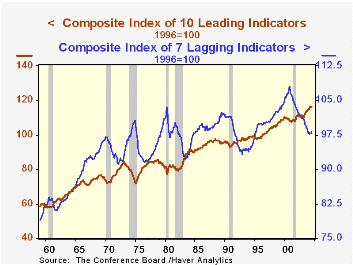 Global| Jul 22 2004
Global| Jul 22 2004Leading Indicators Fell
by:Tom Moeller
|in:Economy in Brief
Summary
The July Composite Index of Leading Economic Indicators reported by the Conference Board fell 0.3%. Only a 0.1% reduction had been expected. June's 0.2% fall was revised to 0.1%. Among the 10 components, six contributed negatively in [...]

The July Composite Index of Leading Economic Indicators reported by the Conference Board fell 0.3%. Only a 0.1% reduction had been expected. June's 0.2% fall was revised to 0.1%.
Among the 10 components, six contributed negatively in July and four positively. Financial indicators, stock prices and the yield curve, pulled the index down a total of 0.29%. Building permits gave the largest boost, 0.26%.
The leading index is based on eight previously reported economic data series and two, orders for consumer and for capital goods, which are estimated.
The coincident indicators ticked 0.1% higher, while the original 0.1% rise in June was revised to zero change. In this July report, employment and production both contributed to the modest rise. The lagging index gained 0.5%, also moved by financial components: the prime rate rose 25 basis points and bank loans to business rose by their largest amount since early 2000.
Lagging indicators appear to be most useful in confirming the development of business cycle expansions. As seen in the accompanying graph, the index tends to continue falling even after the economy has begun to recover, so it is the upturn in the "laggers" that indicates the maturing of the expansion process.
Visit the Conference Board's site for coverage of leading indicator series from around the world.
| Business Cycle Indicators | July | June | May | Y/Y | 2003 | 2002 | 2001 |
|---|---|---|---|---|---|---|---|
| Leading | -0.3% | -0.1% | 0.4% | 2.8% | 1.3% | 2.2% | -0.8% |
| Coincident | 0.1% | 0.0% | 0.3% | 2.4% | 0.4% | -0.5% | -0.5% |
| Lagging | 0.5% | 0.0% | 0.1% | -1.3% | -2.2% | -2.8% | -1.4% |
Tom Moeller
AuthorMore in Author Profile »Prior to joining Haver Analytics in 2000, Mr. Moeller worked as the Economist at Chancellor Capital Management from 1985 to 1999. There, he developed comprehensive economic forecasts and interpreted economic data for equity and fixed income portfolio managers. Also at Chancellor, Mr. Moeller worked as an equity analyst and was responsible for researching and rating companies in the economically sensitive automobile and housing industries for investment in Chancellor’s equity portfolio. Prior to joining Chancellor, Mr. Moeller was an Economist at Citibank from 1979 to 1984. He also analyzed pricing behavior in the metals industry for the Council on Wage and Price Stability in Washington, D.C. In 1999, Mr. Moeller received the award for most accurate forecast from the Forecasters' Club of New York. From 1990 to 1992 he was President of the New York Association for Business Economists. Mr. Moeller earned an M.B.A. in Finance from Fordham University, where he graduated in 1987. He holds a Bachelor of Arts in Economics from George Washington University.






